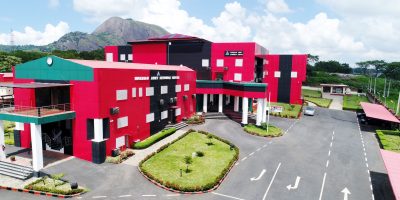Nigerian Army Resource Centre (NARC) Weekly Subject Experts’ Presentation was held at Hall F, ML Agwai Block, Abuja. There were two presentations made by the Subject Experts on China, Middle East, North Africa and Turkey.
The first presentation by Maj Gen JA Orokpo (Rtd) subject experts on China, Centered his presentation on how University of Hong Kong Probes Use of Fake Documents to join Business School. The South China Morning Post reported on 21 May 24 that a Business School at Hong Kong’s oldest university is looking into whether there are more applicants who use fake documents to enrol in its Master’s programme after uncovering ‘small number’ of cases and identifying agencies suspected of supplying the papers. A spokeswoman for the University of Hong Kong’s Business School also warned that those caught using fake documents would have their admission offers rescinded, their enrolment nullified and would be reported to the Police. The incident came to light when a screenshot shared on Reddit-like forum LIHKG showed an online post written in simplified Chinese from someone who claimed to be graduating soon, saying the qualification he submitted for the admission process had recently been checked again by the University.
In his analysis and lessons for Nigeria, Maj Gen JA Orokpo (Rtd) noted that, the issue of Nigerians using fake certificates to gain admission into tertiary institutions and or fake documents for employment into the civil service is a serious problem that has been reported in various contexts. The vanguard newspapers reported on 8 Jan 24 that in November 2020, a national daily reported of statistics that emerged from screening exercises in Niger and Plateau States were high, “so huge that one is prompted to believe there are probably more forged certificates in circulation in Nigeria than genuine ones”. It further stated that a committee that screened civil servants in Niger State had disclosed that 80% of staff of the State Ministry of Education were discovered to be in service for several years with forged certificates.
He recommended that, the FGN should implement robust credential verification systems across all tertiary institutions and government agencies and also establish a centralised platform for verifying academic certificates that is reliable, user-friendly and accessible.
While the Second presentation by Brig Gen SO Oloyede Subject experts on Middle East, North Africa and Turkey, focused his presentation on howTurkey Looks to Russia to Build Second Power Plant. On 28 March 2024, Arabian Gulf Business Insight (2024) reported that Turkey hopes to expand its partnership with Russia’s Rosatom. This is to enable Turkey to develop its second nuclear power plant in Sinop, on the southern coast of the Black Sea. The Russian company is working on the country’s first Akkuyu nuclear power plant (NPP) in Mersin province on the Mediterranean coast. According to Turkey’s Energy and Natural Resources Minister, Alparslan Bayraktar, “We have a great potential for renewables and energy efficiency, but we absolutely need to add nuclear energy into our energy mix”. The Minister added that the construction of four reactors in the Akkuyu Nuclear Power Plant will generate 7.2 gigawatts (GW) of nuclear capacity by 2035 and 20 GW by 2050 (AGBI, 2024).
[In his analysis and lessons for Nigeria, Brig Gen So Oloyede stressed that, Like Turkey, Nigeria’s pursuit of nuclear energy has been marked by significant developments and its commitment to establishing a robust nuclear energy programme (Nuclear Business Platform, 2016). In particular, Small Modular Reactors (SMRs) are one of the options that Nigeria was considering to introduce to its energy mix (Nuclear Business Platform, 2016). Nigeria possesses a 34kW research reactor at the Centre for Energy Research and Training (CERT) and various open radioactive sources for research (Nuclear Business Platform, 2019). Additionally, the country has invested in three 14 MeV Neutron Generators, an 8 MeV van de Graff accelerator, and a tandem accelerator.
He recommended that, the Federal Government of Nigeria should upscale its efforts at collaborating and cooperating with members of IAEA and other technology providers for the necessary information required for SMR deployment and also amend the Nuclear Safety and Radiation Protection Act 19 to clearly outline the responsibilities and independence of regulatory bodies and other stakeholders.































